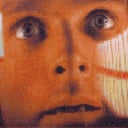I have never been a fan of science fiction. For me, fiction has to explore the combinatorial possibilities of people interacting under the constraints imposed by our biology and history. When an author is free to suspend the constraints, it's tennis without a net.
Nonetheless, I profess an admiration for 2001. Its visual grandeur shows that 35 years of progress in special effects has not led to commensurate progress in cinematic quality. One of its themes - the nature of intelligence and its relation to aggression - is treated so vividly that I continue to refer to the movie in my teaching and writing. In particular, 2001 embodies one of the recurring motifs in Western literature - that sin and knowledge, evil and intelligence, aggression and know-how, go hand in hand. Think of Adam and Eve, Prometheus, Pandora, Faust, Frankenstein, the Sorceror's Apprentice. In 2001, it takes just minutes for our hairy ancestor to go from manipulating a bone to wielding it as a club, which fades into a space station, in turn setting the stage for the sophisticated but murderous Hal.
Amusingly, it's the machine that has all the personality in the movie, with the humans drained of affect or credible personal relationships. This made sense in the context of the film, but it also summarises what I find unsatisfying in sci-fi in general. That's why I prefer a related genre that might be called cognitive science fiction - novels in which one character is a cognitive scientist caught up in great themes of literature which are also themes of the sciences of mind, such as reason, emotion, free will, love, hate, consciousness, memory. This overlap has yielded some wonderful novels such as Rebecca Goldstein's The Mind-Body Problem, David Lodge's Thinks ... - which explores the contrasting understanding of consciousness in art and science through an affair between an English professor and a cognitive scientist - and William Boyd's Brazzaville Beach. In Carole Cadwalladr's forthcoming The Family Tree a young woman is married to a behavioral geneticist who is a constant reminder that she risks inheriting her family's dysfunctionality.
